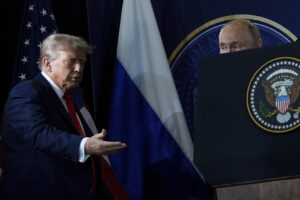Myanmar elects new president but full democracy’s yet to come

Aung San Suu Kyi, the leader of Myanmar’s opposition National League for Democracy, at a polling station in Kawhmu. Picture by Ye Aung Thu | AFP/Getty Images

On April 1, Myanmar’s new President, Htin Kyaw, will take his post in office and usher in a new era in the country’s politics. His assumption of the role highlights a democratic transition that has been slowly creeping on Myanmar, one that began in 2010 with political activist Daw Aung San Suu Kyi’s release from house arrest after 20 years.
Htin Kyaw will be the first civilian to hold the post since 1962, when a military coup by General Ne Win overthrew the civilian government. Htin Kyaw is also a trusted confidante of Daw Aung San Suu Kyi. She is known not only for being the daughter of General Aung San, but also for founding the National League for Democracy (NLD) in 1988 prior the “8888” Revolution. On August 8, 1998, monks, students and other Myanmar nationals took to the streets to protest poor economic conditions and rampant corruption. The uprising culminated in the slaughter of thousands by the military; the State Law and Order Restoration Council was created, and Daw Aung San Suu Kyi was placed on house arrest for her activism and calls for democracy.
Htin Kyaw’s victory does not come as a surprise. The NLD has held a majority in Parliament since the November 2015 elections in which they won 390 seats. (The military government won only 42 seats.) In Myanmar, the lower and upper houses of Parliament each nominate a presidential candidate, as does the military. With her party holding a majority, Daw Suu Kyi had the right to nominate a new president. Within the system, the winner becomes President, and the two runners-up are assigned Vice Presidents. The second Vice President, Henry Van Thio, also hails from the NLD and is a member of the Chin District, a region sharing a border with India. Van Thio will be the first member of an ethnic minority to hold such a high position.
After the election, many expressed their happiness. Htoo May, a lawmaker for the Arakan National Party (which represents the Rakhine ethnic group based in the Rakhine and Yangon states) said, “He will represent what the people need.” But what do they need?
Myanmar is still far from becoming a democracy. Although generally a champion of democratic values, Aung San Suu Kyi has made claims that her influence will put her “above the President,” implying that Htin Kyaw would be nothing more than a “proxy president.” Even Htin Kyaw claimed that it was more her victory than his own. Aung San Suu Kyi cannot serve as President herself because of a clause in the Constitution barring anyone with foreign relatives from holding the position, (her late husband was British, as are her two sons).
Further complicating matters, the first Vice President, Myint Swe, is a U.S.-sanctioned ex-military leader. In 2007, during the Saffron Revolution, he was the head of military intelligence, making him likely in tune with the arrests of the numerous monks protesting against the government at the time. The Saffron Revolution proved extremely dangerous for the military government, as the Buddhist monks it targeted are extremely respected in Myanmar, and gave legitimacy to those protesting against the removal of fuel subsidies and massive price increases. Myint Swe also has family ties to General Tan Shwe, the ruler of the military junta and chairman of the State Peace and Development Council from 1992 to 2011. Tan Shwe was considered one of the harshest dictators in the country’s history, with monks systematically being sent to detention camps in the Burmese jungles. Under his rule, Myanmar also became the country with the most child soldiers in the world, according to Human Rights Watch.
Thein Sein, the country’s outgoing President, and his government have undertaken some reforms since taking office in 2011, but these are mainly related to business and investment. Myanmar is still plagued with many age-old problems that are being ignored. Poverty, ethnic tensions, and drug-trafficking are all inherently linked. In a nation with 51.4 million people, the United Nations Development Program (UNDP) estimates that 26 percent of the population is considered poor, especially in rural areas, where 70 percent of the population lives. These areas, such as the Shan State, are often those that are also most involved with opium cultivation. Meanwhile, the United Nations Office on Drugs and Crime (UNODC) recently found that opium cultivation has dramatically increased. Indeed, the average area of poppy cultivation per opium poppy-growing household more than doubled from 2003 to 2013, according to their research. From 2013 to 2014, the consumption of opium is estimated to have increased by 83 percent, while the consumption of heroin increased by 115 percent. In 2015, Myanmar became the foremost opium producer in the Southeast Asian region, and the second in the world, after Afghanistan. And former New York Times Myanmar correspondent, Thomas Fuller, found that while profits generated by the drug trade led to an economic boom, such activities also weakened the country’s efforts toward democratization, due to strong links to corruption.
Most drug production and consumption in Myanmar is usually located in regions that border either China or India, such as the Shan state or the Kachin state, which are also amongst the poorest regions in Myanmar and riddled with ethnic tensions. Even with Van Thio’s surprising electoral win, Myanmar still has different levels of citizenship, and ethnic conflict is rampant.
Little is being done to change that. Despite Aung San Suu Kyi’s strong will to bring peace and democracy to her country, she has not said a word on the plight of the Rohingya Muslims living in the Rakhine state, who’ve been fleeing both Bangladesh and Myanmar to be stranded in the Andaman sea, desperately putting their faith in the hands of Malaysia and Thailand’s “generosity.” In 2013, Aung San Suu Kyi publicly called for an end to violence in the Kachin Conflict. While her rhetoric has not made much of a difference, at least on this matter she made a call for action.
Numerous ethnic conflicts remain a very present reality in Myanmar. While a Nationwide Ceasefire Agreement (NCA) was settled in October 2015, effectively putting a stop to the Karen Nationalist Movement, one of the world’s longest conflicts, only seven out of fifteen ethnic armed groups have actually signed it. And even signed agreements often fall by the wasteside. In Kachin, for example, the Kachin Liberation Army is still well-armed despite a prior cease-fire agreement signed in 2014.
Despite the many problems, Daw Aung San Suu Kyi is seen as a beacon of democracy in Myanmar, as many Burmese believe she will bring more positive change. Her shortcomings aside, Daw Aung San Suu Kyi has shown that patience and perseverance are valuable assets in statebuilding and peacebuilding. But that might not be enough. Aung San Suu Kyi will probably become the Foreign Minister of Myanmar, and while she is one of the most respected figures in Myanmar politics, the ethnic issues in her country, if unresolved and unacknowledged, will stand in the way of building a strong state. It is also crucial that outdated narcotics laws be updated. These include the 1917 Burma Excise Act, which criminalizes needle possession by non-medical personnel. Increased repressive policies aimed at arresting drug users and eradicating opium poppy fields have only hindered development, as problems eventually pop up again somewhere else. Researchers point to poverty eradication as the only adequate means to eradicate drugs and create more opportunities for those who have little choice than to turn to the ever-so-fruitful drug trade.
Furthermore, Myanmar still has a strong military party, and Aung San Suu Kyi does not want history to repeat itself. In 1990, the NLD won parliamentary elections, which led to severe arrests by the Junta. If she is going to solve the problems in Myanmar, she must be cautious. Pushing along the transition to democracy will require Aung San Suu Kyi’s strong personality and courage, if she wants to surpass all the obstacles in place.
Geraldine is an M.A. candidate in International Relations at New York University. She graduated with a BA from McGill University with a focus on International Development Studies and Political Science. Her main area of interest is Southeast Asia having grown up in Malaysia.




